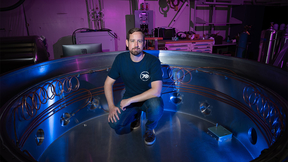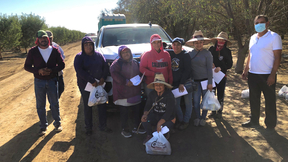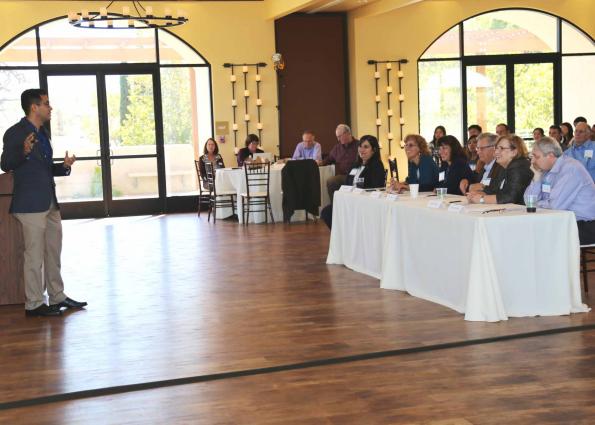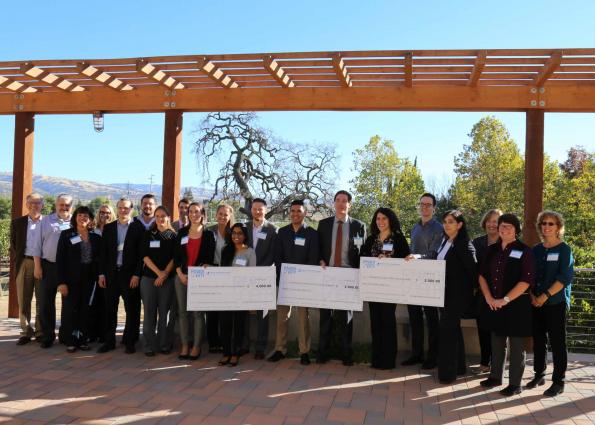Postdocs shine at Laboratory 'Research Slam!'
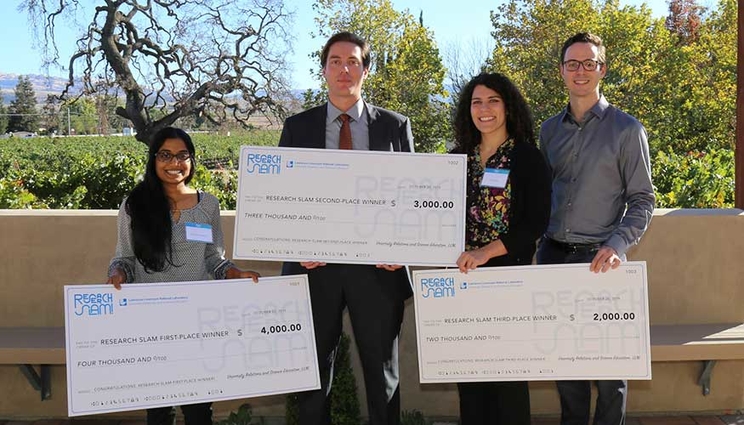 (Download Image)
Research Slam! winners pictured from left: Ramya Tunuguntla (1st place, $4,000); Michael Homel (2nd place, $3,000); Anna Belle and Daniel McCartt (tied for 3rd place, $2,000). Photos by Carrie Martin/LLNL
(Download Image)
Research Slam! winners pictured from left: Ramya Tunuguntla (1st place, $4,000); Michael Homel (2nd place, $3,000); Anna Belle and Daniel McCartt (tied for 3rd place, $2,000). Photos by Carrie Martin/LLNL
The Laboratory is home to a workforce of world-class scientific talent, a pool that includes a population of 229 postdoctoral researchers, who are a critical component in executing the Lab’s mission. To showcase their diverse projects and to provide an opportunity for them to hone their presentation skills, Laboratory postdocs were invited to participate in Research Slam! 2016, the first of what is to become an annual competition.
The competition affords postdocs the opportunity to showcase the research they are engaged in while working at the Laboratory and to challenge them to see who could give the best three-minute presentation answering the question, "Why is your research important?"
A total of 68 Laboratory postdocs submitted applications and abstracts in early September and competed in preliminary rounds later in the month. Presentations were prepared for a general audience of fellow postdocs, staff scientists and managers both in and outside their field of expertise.
The following 14 finalists were chosen to compete in the final competition showcase at Garre Vineyard & Winery:
- Anna Belle - Engineering/Materials Engineering Division
- Timofey Frolov – Physical & Life Sciences/Materials Science Division
- Sarah Grady - Physical & Life Sciences/Biosciences and Biotechnology Division
- Anna Hiszpanski - Physical & Life Sciences/Materials Science Division
- Michael Homel - Physical & Life Sciences/Atmospheric Earth and Energy Division
- Jennifer Knipe - Physical & Life Sciences/Materials Science Division
- Josh Magee - Physical & Life Sciences/Nuclear and Chemical Sciences Division
- Michael Mayhew – Engineering/Computational Engineering Division
- Daniel McCartt - Physical & Life Sciences/Atmospheric Earth and Energy Division
- Rodrigo Navarro Perez - Physical & Life Sciences/Nuclear and Chemical Sciences Division
- Tane Remington – Weapons Complex and Integration
- Ramya Tunuguntla - Physical & Life Sciences/Biosciences and Biotechnology Division
- Thomas Voisin - Physical & Life Sciences/Materials Science Division
- Congwang Ye - Engineering/Materials Engineering Division
Kim Budil, vice president for the Office of the National Laboratories at the University of California Office of the President (UCOP), served as the event moderator, and judges -- Bill Goldstein, LLNL director; Pat Falcone, deputy director for Science and Technology (DDS&T); Al Ramponi, director’s chief of staff; and Lori Souza, former assistant deputy director, Operations -- were given the difficult task of determining who would be awarded the cash prizes for first ($4,000), second ($3,000) and third ($2,000) place presentations.
Judges followed strict criteria when evaluating the presentations and were asked to consider the significance of the research presented and the effectiveness of delivery.
Unable to pick just one third place winner, the judges declared a tie between Anna Belle and Daniel McCartt who will each get a $2,000 award.
Belle, originally from Austin, Texas, has a bachelor’s in chemistry from Baylor University and a Ph.D. in analytical chemistry from the University of North Carolina. She came to the Lab in 2014 and works in the Center for Micro and Nanotechnology, Materials Engineering Division of the Engineering Directorate. Her presentation "50 Billion Neurons Can’t be Wrong: Listening to Glutamate," summarized her work developing micro-sensors to detect electrical and chemical signals in the body.
"Since joining the Lab, I have learned the importance of communication in research teams and science in general," Belle said. "Participating in Research Slam! has been a great experience and taught me how to distill down a complex concept into just a few sentences."
McCartt came to the Laboratory straight from grad school in 2011 to create technology that could expedite drug development. McCartt, originally from Johnson City, Tennessee, has a bachelor’s in engineering from Duke University and a Ph.D. in engineering from Stanford. He works in the Center for Accelerator Mass Spectrometry (CAMS), Atmospheric Earth and Energy Division within the Physical and Life Sciences Directorate (PLS). His presentation, "Harnessing the Building Block of Life: Using Carbon-14 to Monitor Fossil Fuel Emissions," provided an overview of his research designing and developing cavity ring-down spectroscopy instruments for the detection of carbon-14.
"The Lab provides an excellent environment for research and collaboration," McCartt said."Working at CAMS, I have learned a lot about analytical chemistry."
Michael Homel received the $3,000 second place prize. Homel is from Salt Lake City, Utah, and attended the University of Utah, where he earned a Ph.D. in mechanical engineering. He joined the Laboratory in 2015 and works in Computational Geosciences within the Atmospheric, Earth and Energy Division of the PLS Directorate. His presentation, "A Virtual Materials Laboratory for a Multi-Scale World," touched on his research of predicting the way materials will respond when subjected to extreme deformations, which involves a combination of analytical modeling, computer simulation and experiments.
"Participating in this competition taught me the importance of starting a talk in a way that excites the audience," Homel said. "Being accustomed to presenting my work using the terminology familiar to those in my field, it’s tempting to spend time in a general-audience talk defining/teaching this terminology to the audience. But in iterating my talk I found that it was much more effective to avoid this and find a way to communicate the idea without specialized language."
The $4,000 first place prize went to Ramya Tunuguntla, a postdoc from San Diego, who works in the Biosciences and Biotechnology Division within the PLS Directorate. Tunuguntla came to the Lab in 2010 as a Livermore Graduate Scholar and in 2014 started as a Laboratory postdoc. She received the PLS Outstanding Postdoc Award in 2015.
"Working at the Laboratory is a combination of that industrial and academic experience that I really like," Tunuguntla said. "LLNL research is so amazingly diverse and staff scientists are so accessible. It’s very collaborative; you can work with all different people and different projects."
Tunuguntla is now part of a multidisciplinary team working to create synthetic analogs of protein ion channels consisting of short carbon nanotube porins that can be reconstituted into synthetic bilayers or live cell membranes to form sub-nanometer pores that transport water, protons, small ions and DNA.
"We historically get our drinking water from lakes and rivers, but California’s drought combined with over population and overuse, is making that source stressed. Desalination could open up the oceans as a possible water source," she said.
Tunuguntla wowed the judges with her lively presentation, "Carbon Nanotubes: High-Speed Water Channels for Desalination," that began with her reciting a line from "The Rime of the Ancient Mariner"" "Water, water, everywhere, nor any drop to drink." It concluded with a catchy poem to remind the audience why desalination is important. "Participating in Research Slam! was a fun break from making technical and data-filled talks," she said. "I really enjoy writing and playing music and was able to put my personality into the presentation by incorporating a poem into my talk, which was super corny, but fun for me."
Nine out of the 14 finalists were from the PLS Directorate, with presentations exploring a wide range of research topics. Not only was PLS well represented in the finals, three out of the four winners also are postdocs working in PLS.
"The caliber of all the finalists' scientific research and their presentations were extremely impressive. It is not easy to describe one’s research in a meaningful way in just three minutes," said Glenn Fox, PLS associate director. "I am proud to have so many of the finalists and competition winners be from PLS, and I’m impressed with the time and effort that it took to put these presentations together."
"All of the postdocs gave polished, compelling presentations, making the judges' jobs extremely difficult," said Kris Kulp, director of the Institutional Postdoc Program Board. "Improving communication skills is such an important part of our postdocs’ career development that we are planning on making this an annual event. We are looking forward to an even more successful competition next year."
Research Slam! 2016 was sponsored by LLNL's Deputy Director of Science & Technology, and the University Relations and Science Education Program.
Contact
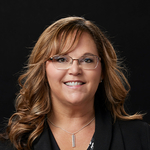 Carrie L Martin
Carrie L Martin
[email protected]
(925) 424-4715
Related Links
Careers at LLNLLLNL Postdoc Program
Tags
Academic EngagementPostdocs
Science
Careers
Community Outreach
Featured Articles
